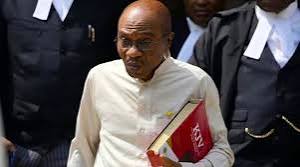A recent court ruling has garnered significant attention as the former Governor of the Central Bank of Nigeria, Godwin Emefiele, has been denied permission to travel to the United Kingdom for a medical check-up. The decision was made by a High Court of the Federal Capital Territory in Maitama, where Emefiele is facing an amended 20-count charge related to procurement fraud, obtaining by pretense, and forgery during his tenure as the governor of the apex bank.

The application for medical leave was rigorously contested, with the trial Judge, Justice Hamza Muazu, concluding that Emefiele had failed to provide sufficient reasons to demonstrate the essential and unavoidable nature of his medical trip. The judge highlighted that Emefiele had not presented a copy of the medical appointment or invitation from the United Kingdom, crucial documentation to substantiate the need for the trip. Additionally, the judge emphasized that Emefiele had not proven that his ailment could not be treated within Nigeria.
The court’s decision to dismiss Emefiele’s request was underlined by the complexity of the situation, as the former central bank governor is facing trials in three different courts in the Federal Capital Territory and Lagos for various charges. Justice Muazu expressed that while the court possesses discretionary power, it would be excessive to grant Emefiele’s request under the current circumstances, referencing the existing legal proceedings.
Furthermore, Emefiele’s request was countered by the Economic and Financial Crimes Commission (EFCC), arguing that there was no medical report indicating that his ailment necessitated treatment abroad. The prosecution counsel also raised concerns about Emefiele’s potential flight risk due to his international connections with co-conspirators and highlighted the existing multiple trials.
Emefiele’s counsel, Hakeem Labi-Lawal, urged the court to consider his client’s request and release his passport, which had been submitted as part of his bail conditions. However, the defense arguments were deemed speculative, and the court ultimately ruled against granting the application, affirming the continuation of the trial.
The allegations against Emefiele involve the forgery of a document related to a “Presidential Directive on Foreign Election Observer Missions” and the abuse of his authority to confer unfair and corrupt advantages upon specific companies. The amended charge also accuses him of obtaining a substantial sum of money through false pretenses by misrepresenting a directive from the Secretary to the Government of the Federation, thus raising serious concerns about alleged misconduct during his tenure.
This development amplifies the scrutiny surrounding high-profile corruption cases in Nigeria and highlights the legal processes in place to hold individuals in positions of authority accountable. The denial of Emefiele’s request underscores the judiciary’s commitment to ensuring that legal proceedings are conducted diligently and without compromise, particularly in cases involving individuals holding pivotal roles in the nation’s financial institutions.
The broader implications of this ruling raise questions about accountability, transparency, and the integrity of public office holders. As the trial continues, the legal process will play a crucial role in determining the outcome of the allegations against Emefiele and further shaping the landscape of governance and financial oversight in Nigeria.
This decision sets a precedent regarding the intersection of legal obligations and personal circumstances for individuals facing serious allegations, highlighting the intricate balance between individual rights and the imperatives of due process and accountability. The court’s ruling serves as a reminder of the significance of upholding the rule of law in addressing allegations of corruption and malfeasance in public office, ultimately contributing to the ongoing efforts to foster a transparent and ethical governance framework in Nigeria.



